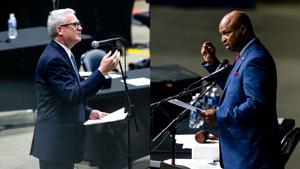Illinois GOP calls for hearings before cuts to state agencies

(The Center Square) – With Gov. J.B. Pritzker preparing to deliver his budget address Wednesday, lawmakers are sounding off on what may be in store.
Coming off the defeat of his graduated income tax proposal during the November election, Pritzker is preparing a budget plan that doesn’t increase overall state spending or raise the flat-rate income tax from the existing 4.95%.
The state’s existing spending plan is more than $3 billion out of balance. And the state’s unfunded pension liability tops $140 billion.
During a virtual news conference on Monday, House Minority leader Jim Durkin said Pritzker’s plans are unclear ahead of budget address.
“We want to know what exactly his plan is,” said Durkin. “He is the one who’s responsible, under the constitution, to provide a balanced budget on a yearly basis.”
According to the Pritzker administration, the proposed budget will keep spending flat, including education spending. State Rep. Tom Demmer said a bipartisan effort to revise the education funding formula was a start.
“Part of that we set a goal of increasing funding and increasing state aid support for education in order to alleviate property tax burdens on many communities across Illinois,” Demmer said.
Pritzker’s administration has said better-than-expected tax revenue cut an anticipated deficit for the upcoming budget year from $5.5 billion to $3 billion.
The administration also has said it continues to wait for more federal aid from Washington D.C.
Pritzker said the budget plan he will present “is reflective of what I’ve been saying for some time now, which is that we’re going to have to make some painful cuts in state government in order to balance the budget.”
The governor has yet to give details on any of those cuts ahead of the budget address.
“We should have hearings on these agency cuts,” Durkin said. “Bring the directors in and do it in a responsible, transparent manner.”
The governor’s budget proposal is a starting point for spending talks. Democrats hold supermajorities in both chambers of the legislature, meaning they can pass legislation without Republican support.
Disclaimer: This content is distributed by The Center Square
